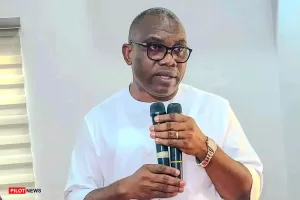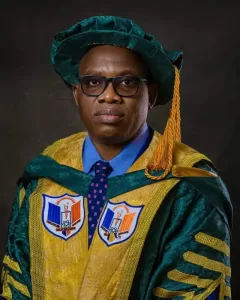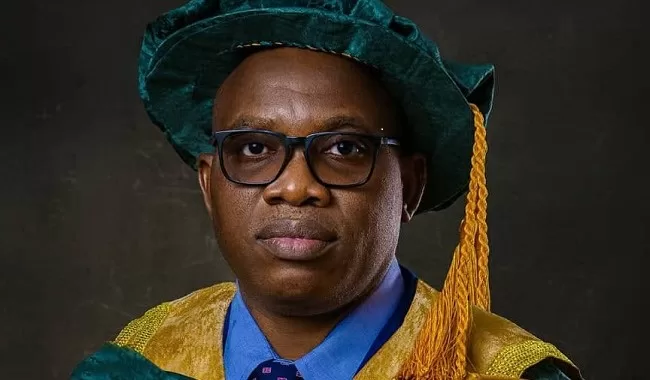Nnamdi Azikiwe University (UNIZIK), Awka, has raised objections to a recent letter from the Federal Ministry of Education that claimed the university’s Governing Council had been dissolved and its Vice-Chancellor, Professor Bernard Odoh, removed.
The Ministry’s letter, signed by Boriowo Folasade, the Director of Press and Public Relations, cited alleged breaches of university regulations and non-compliance with directives as reasons for the actions.
According to the Ministry, the Governing Council’s appointment of Professor Odoh as Vice-Chancellor was deemed invalid, with accusations that Odoh was unqualified for the position, leading to tensions within the institution.
However, in a detailed response issued on November 20, 2024, UNIZIK dismissed the Ministry’s actions as an attempt to destabilize the university.
Charles Otu, the Personal Assistant on Media and Publicity to Professor Odoh, described the Ministry’s intervention as “mischievous.”
The university challenged the Ministry’s authority to dissolve the Governing Council or remove the Vice-Chancellor, pointing out that the Nnamdi Azikiwe University Act, LFN 2004, gives the President, as the Visitor to the university, the exclusive power to make such decisions.
UNIZIK argued that the Ministry’s actions bypassed the proper channels, as the Governing Council members and the Vice-Chancellor had not been formally questioned or notified. The university maintained that the appointment of Professor Odoh followed due process and had been widely accepted by stakeholders.
“The governing council is being punished for following due process to appoint me,” Odoh later stated.
In its statement, UNIZIK also accused the Ministry of acting in contempt of court, highlighting that the matter is currently before the National Industrial Court.
The university argued that the Ministry’s actions were “premature and inappropriate,” as the court had yet to deliver its judgment.
Contrary to the Ministry’s claims that there had been a “breakdown of law and order,” the university maintained that its campuses remained calm, and that Professor Odoh had continued to perform his duties without disruption.
The university also questioned the authenticity of the letter from the Ministry, noting that it was signed by a Public Relations Director rather than the Permanent Secretary or the Minister of Education.
UNIZIK further criticized the lack of formal communication with the Governing Council Chairman, Ambassador Greg Mbadiwe.
“Top among the many other flaws in the purported ‘sack letter’ is the fact that even the Council’s Chairman, who was duly appointed with a letter, has not been officially or formally communicated about this purported dissolution,” the statement read.
UNIZIK urged its community and the public to remain calm, emphasizing that the courts should be allowed to determine the legality of the Ministry’s actions.
“Let peace continue to reign supreme in our revered citadel of learning,” the university concluded, reaffirming its commitment to the rule of law and calling for an expedited resolution through judicial processes.
Odoh Responds to His Removal
Professor Bernard Odoh, in an interview with AriseTV on November 21, 2024, expressed his strong disapproval of President Bola Tinubu’s decision to sack him as Vice-Chancellor of UNIZIK.
He argued that since his appointment was not made via a press release, his removal should not be communicated in the same manner.
Odoh said, “I’m not imposing myself on the institution,” adding that he had followed all necessary procedures in applying for and being appointed to the role.
On November 20, 2024, Tinubu had dissolved the university’s Governing Council and removed both Odoh and the Registrar, citing irregularities in the appointment process.
According to Bayo Onanuga, the Special Adviser to the President on Information and Strategy, the government’s decision was prompted by reports that the Governing Council had illegally appointed an “unqualified” Vice-Chancellor without following due process.
The statement referred to the “apparent disregard for the university’s governing laws in its selection process.”
Odoh responded to these claims by defending his qualifications. “I’m qualified for this position. Three assessors assessed me. I became a professor on October 1, 2015,” he stated.

READ ALSO: Tinubu Launches NEIF to Tackle Nigeria’s Infrastructure Challenges
He added that his appointment followed the proper procedure, noting that he had applied for the position and had not imposed himself on the university.
Odoh also rejected the accusation that he was unqualified, alleging that “People paid to remove my records from a university.”
The Vice-Chancellor also pointed out that legal challenges to his appointment were still pending before the Federal High Court and the National Industrial Court.
He criticized the Ministry and the President for acting prematurely before the court had ruled on the matter.
“The minister jumped the gun. The court has not ruled on this matter. I cannot be removed through a press release,” Odoh said, emphasizing that no formal panel of inquiry had been convened to review his appointment.
In his remarks, Odoh also touched on the ethnic dimension of the controversy, claiming that forces opposed to his appointment were motivated by bias due to his origin from Ebonyi State.
“I’m from Ebonyi state. We are regarded as third class people. People feel I’m not qualified because I come from Ebonyi state,” he said.
Odoh further stated that the actions taken by the Ministry were likely to escalate tensions at the university, suggesting that the Federal Ministry of Education was “introducing a crisis on campus.”
Despite his removal, Odoh made it clear that he would continue in office until the courts had resolved the legal issues.
“We would wish to maintain that hence parties have remained in court, let the issues be expeditiously tested and established by the relevant provisions of our laws,” he concluded, calling on members of the university community to continue their work as usual.
Controversy Surrounds Odoh’s Appointment
The controversy over Professor Odoh’s appointment as Vice-Chancellor of UNIZIK dates back to October 29, 2024, when he was announced as the seventh substantive Vice-Chancellor of the university.
His appointment quickly became a source of contention due to disputes over his academic qualifications.
For example, Odoh’s profile, which listed him as a former visiting professor at the Federal University, Gusau, between 2015 and 2017, was contested by both the university and the Academic Staff Union of Universities (ASUU).

In response to these concerns, the Federal Ministry of Education on November 1, 2024, nullified Odoh’s appointment, accusing the Governing Council of irregularities in the recruitment process.
The Ministry’s memo highlighted that the appointment had been made “without representatives of the ministry, the internal council members, and other stakeholders.” However, UNIZIK rejected the Ministry’s stance, insisting that the Governing Council had acted in compliance with a valid court judgment that authorized the selection of Odoh.
Odoh’s supporters have consistently defended the appointment process.
“The greatest question mark on the integrity of the purported letter is the fact that it never emanated from the President or Office of the Secretary to the Government of the Federation who issued the council members with appointment letters,” Odoh stated, suggesting that the Ministry’s letter lacked the necessary authority.
Despite ongoing legal challenges and public debate over the validity of his appointment, Odoh remains resolute.
“The governing council is being punished for following due process to appoint me,” he said.
As the case progresses through the courts, the conflict between the university and the Ministry continues to unfold, with both sides awaiting a final resolution on the matter.

